|
|
|
Sort Order |
|
|
|
Items / Page
|
|
|
|
|
|
|
| Srl | Item |
| 1 |
ID:
027833
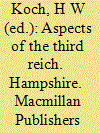

|
|
|
|
|
| Publication |
Hampshire, Macmillan Publishers Ltd, 1985.
|
| Description |
viii, 611p.Hbk
|
| Standard Number |
0333352726
|
|
|
|
|
|
|
|
|
|
|
|
Copies: C:1/I:0,R:0,Q:0
Circulation
| Accession# | Call# | Current Location | Status | Policy | Location |
| 028728 | 943.086/ASP 028728 | Main | On Shelf | General | |
|
|
|
|
| 2 |
ID:
192233
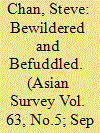

|
|
|
|
|
| Summary/Abstract |
I challenge the dominant Western discourse on China’s rise. This discourse tends to reflect political construction rather than thoughtful scholarship. It is poorly informed by historical evidence and usually evades comparison of China’s conduct with that of other countries, such as the United States, now or in the past. It is also characterized by strong tendencies of groupthink and revisionist scholarship to adjust to prevailing official policies and popular sentiments instead of scrutinizing their validity. This discourse is not only wrong but also dangerous.
|
|
|
|
|
|
|
|
|
|
|
|
|
|
|
|
| 3 |
ID:
192167
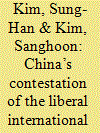

|
|
|
|
|
| Summary/Abstract |
The concept of ‘revisionism’ has caught the attention of international relations scholars amid intensifying rivalry between the United States and China. It is a trademark of rising powers, and China was likewise expected to become a revisionist power, intent on changing the status quo. However, history tells us that not all rising powers necessarily become revolutionary states, seeking to overturn the prevailing order and replace it with another through hegemonic wars. This paper presents a novel understanding of revisionism by distinguishing between strategic ‘contestation’ and ‘challenge’. In the context of declining unipolarity, a dissatisfied rising power will contest the rules and principles of issue-specific regimes and demand legitimate adjustments that better reflect the new distribution of power. A challenge emerges when demands are rejected, and a contestation leads to ‘deconcentration’ and ‘delegitimation’ of the established order. The establishment of the AIIB can be examined as an example of contested multilateralism that falls short of a challenge. This paper concludes that China is ‘contesting’, not ‘challenging’ the liberal international order and suggests a set of countermeasures that the U.S. can think of: selective accommodation, reinforcement of alliances and partnerships, and overcoming domestic challenges such as populism that undermine the liberal values, constitutive of the liberal international order.
|
|
|
|
|
|
|
|
|
|
|
|
|
|
|
|
| 4 |
ID:
089722


|
|
|
| 5 |
ID:
172200
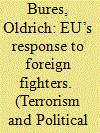

|
|
|
|
|
| Summary/Abstract |
The conflicts in Syria and Iraq have put foreign fighters—individuals travelling from other countries to engage in these conflicts—high on the security agenda at both the national and EU level. Drawing on theoretical arguments previously advanced to explain the haphazard evolution of the EU’s counterterrorism efforts after September 11, 2011, this articles discusses the emergence and persistence of key challenges that have hampered the EU response to security threats posed by 5,000 European foreign fighters between 2013 and early 2017. These include the absence of a common EU-level definition; the differences regarding the scope and perceptions of the threats posed to individual Member States; the lack of consensus on root causes of terrorism and radicalization; and the differences among Member States when it comes to addressing the difficulties of criminal prosecution of foreign fighters.
|
|
|
|
|
|
|
|
|
|
|
|
|
|
|
|
| 6 |
ID:
165653


|
|
|
|
|
| Summary/Abstract |
The world entered the era of change no later than the second half of the 2000s; however, analysts still lack a common understanding of the conditions that surrounded the disintegration of the former world order as well as of the processes, horizons and results of the transition to a new global order. This article discusses what exactly is in store for Russia and when—a growing global disorder caused by the collapse of international institutions created after World War II, the preservation of American domination, or something else? It was the United States that started revising the world order; therefore, Russia’s behavior can be considered revisionist only in relation to Washington’s revisionist strategy imposed on it. The current post-Washington world transition is analyzed here in the context of theoretical studies concerning the previous post-Vienna, post-Paris, post-Versailles and post-Yalta transitions and their historical experience.
|
|
|
|
|
|
|
|
|
|
|
|
|
|
|
|
| 7 |
ID:
141530
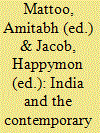

|
|
|
|
|
| Edition |
1st ed.
|
| Publication |
New Delhi, Manohar Publishers and Distributors, 2014.
|
| Description |
366p.hbk
|
| Series |
Australia India Institute Foreign Policy Series; 3
|
| Standard Number |
9789350980385
|
|
|
|
|
|
|
|
|
|
|
|
Copies: C:1/I:0,R:0,Q:0
Circulation
| Accession# | Call# | Current Location | Status | Policy | Location |
| 058332 | 327.54/MAT 058332 | Main | On Shelf | General | |
|
|
|
|
| 8 |
ID:
153242


|
|
|
|
|
| Summary/Abstract |
The aim of this article is to interpret Tokyo's pivotal role in the Kyoto Protocol negotiations as a practice of reconstructing Japan's identity of an ‘international’ and ‘independent’ country. The text bases this argument in poststructural national identity scholarship, which believes that discursive differentiation to international forces (‘others’) plays a decisive role in formulating state's identity. For most parts of the post-war history, United States served as the most significant other for Japan's self construction. Japan narrated itself as a ‘weak’ and ‘subservient’ country dominated by the ‘dominant’ West. This narrative, however, has been significantly altered after the dissolution of the Soviet Union. Japan's identity entrepreneurs began describing Japan as an ‘independent’ or ‘normal’ country, one that proactively contributes to world affairs. Tokyo's legitimization of the Kyoto Protocol was in line with this identity reconstruction. The image of a proactive environmental leader created a symbol of Kyoto that overshadowed the opponents of the Protocol, and lead Japan to ratify it albeit the United States chose to withdraw from it. Once the ratification was over, however, the practical implementation failed to comply with Japan's symbolic commitment.
|
|
|
|
|
|
|
|
|
|
|
|
|
|
|
|
| 9 |
ID:
168498
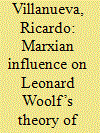

|
|
|
|
|
| Summary/Abstract |
In his own time, Leonard Woolf was one of the most prolific and respected experts on international affairs. Yet, his paramount place in the field fell rapidly, partly because he was a writer whose ideas have been labelled as utopian. This article employs Woolf to challenge the orthodox narrative of the discipline of International Relations (IR) that oversimplifies the early stages of the field as a dichotomy between idealism and realism. While this has already been done cogently by Peter Wilson, this article discloses a Marxist dimension in Woolf’s thought and writings. This is particularly important given that Marxism has regained significance in recent IR debates. Through a contextualist approach, this article demonstrates that Woolf represents a considerable challenge to conventional IR historiography and reveals the significance of Marxian-based understandings in the early stages of the discipline as an alternative to idealism and realism. In addition, this article shows some of the distinctiveness in Woolf’s Marxian writings on imperialism as an alternative to Leninist understandings.
|
|
|
|
|
|
|
|
|
|
|
|
|
|
|
|
| 10 |
ID:
092646


|
|
|
|
|
| Publication |
2009.
|
| Summary/Abstract |
This article argues that the Labour Party has no new vision for British social democracy. New Labour in Government is intellectually tired and lacks ideological vision. Gordon Brown's leadership is managerial and lacking robust ideological content. These problems exist in a period of severe recession and whereby the Conservatives under David Cameron are in the ascendancy. The argument in this article asserts that revisionism is required in the Labour Party. An ideological revisionism which reconnects the Party with an overt vision of social democratic politics; which reconnects the Labour leadership with activists and supporters; and which inspires the next generation of Labour voters.
|
|
|
|
|
|
|
|
|
|
|
|
|
|
|
|
| 11 |
ID:
181817


|
|
|
|
|
| Summary/Abstract |
The article reviews major frameworks for re-evaluating Soviet Central Asian history in anglophone scholarship after the collapse of the Soviet Union. It tackles recent popular concepts such as ‘modernity’, ‘development’ and ‘modernization’ for analysing the Soviet past in the region. It questions the analytical value of the terms as well as their ability to capture the complexity of social, political and economic changes that Central Asia underwent in the course of seven decades between the October Revolution and the dissolution of the USSR. The article furthermore provides an overview of novel themes and approaches in the field and suggests themes for further research.
|
|
|
|
|
|
|
|
|
|
|
|
|
|
|
|
| 12 |
ID:
186880


|
|
|
| 13 |
ID:
090863
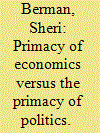

|
|
|
|
|
| Publication |
2009.
|
| Summary/Abstract |
The current economic crisis has once again bought debates about capitalism and globalization to the forefront of the political agenda. Until very recently almost everyone seemed to be convinced that the world was at the dawn of a new era. Yet, the issue at the heart of globalization debates-whether political forces can dominate economic ones or must bow before them-is not new at all. I show that many of the great ideological and political battles of the last century were fought over precisely this ground, and argue that because we have forgotten or misunderstood these earlier debates our current discourse is thin and impoverished. To understand where we are and where we are going, we have to first step back and look closely at where we have been.
|
|
|
|
|
|
|
|
|
|
|
|
|
|
|
|
| 14 |
ID:
178002
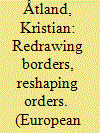

|
|
|
|
|
| Summary/Abstract |
Since Russia’s annexation of Crimea in March 2014, severe limitations have been placed on Ukraine’s coastal state rights and navigational freedoms in the Black and Azov Seas and the Kerch Strait. The “Kerch Strait clash” in November 2018, which resulted in the Russian capture of three Ukrainian naval vessels in international waters south of the strait, can be seen as the temporary culmination of tensions that have been building up over a longer period. In violation of international law and bilateral agreements, Russia has in recent years pursued an increasingly assertive and revisionist policy in the region and sought to turn the maritime spaces on the country’s southwestern flank into a “Russian lake”. This policy is affecting not only the security and economy of neighbouring states such as Ukraine and Georgia, but also the strategic balance in the southeastern corner of Europe. Drawing on empirical evidence derived from Russian, Ukrainian and Western sources, as well as insights from neoclassical realist theory, this article discusses legal, economic and security aspects of Russia’s ongoing quest for a dominant position in the Black Sea region.
|
|
|
|
|
|
|
|
|
|
|
|
|
|
|
|
| 15 |
ID:
111649
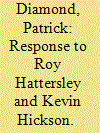

|
|
|
| 16 |
ID:
177307
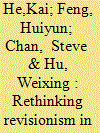

|
|
|
|
|
| Summary/Abstract |
Revisionism is an important concept in international relations discourse, and it is especially prevalent in discussions about relations between China and the United States in the context of a possible power transition. Yet, this concept has until recently not received the systematic research attention that it deserves. We present in this essay different strategies that a revisionist state may pursue. It builds on recent scholarship by other colleagues and is drawn from a larger project of ours to study revisionism historically and develop it conceptually. We argue that military conquest and subversion—or in our terminology, hard revisionism—have become less likely in today’s world compared to the past. Instead, different approaches of soft revisionism intended to advance institutional changes should be given more attention. We provide a typology of these soft revisionist strategies and offer examples from recent Chinese and US conduct to illustrate them.
|
|
|
|
|
|
|
|
|
|
|
|
|
|
|
|
| 17 |
ID:
168871
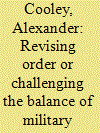

|
|
|
|
|
| Summary/Abstract |
Unimensional accounts of revisionism – those that align states along a single continuum from supporting the status quo to seeking a complete overhaul of the international system – miss important variation between a desire to alter the balance of military power and a desire to alter other elements of international order. We propose a two-dimensional property space that generates four ideal types: status-quo actors, who are satisfied with both order and the distribution of power; reformist actors, who are fine with the current distribution of power but seek to change elements of order; positionalist actors, who see no reason to alter the international order but do aim to shift the distribution of power; and revolutionary actors, who want to overturn both international order and the distribution of capabilities. This framework helps make sense of a number of important debates about hegemony and international order, such as the possibility of revisionist hegemonic powers, controversies over the concept of ‘soft balancing’, and broader dynamics of international goods substitution during power transitions.
|
|
|
|
|
|
|
|
|
|
|
|
|
|
|
|
| 18 |
ID:
158801


|
|
|
| 19 |
ID:
116775
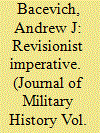

|
|
|
|
|
| Publication |
2012.
|
| Summary/Abstract |
What students want (and citizens deserve) is an account of the past that illuminates the present. The conventional narrative of the twentieth century, exalting World War II as an episode in which Anglo-American good triumphs over Nazi evil, is no longer adequate to that purpose. Today, the "lessons" that narrative teaches mislead rather than guide. The moment is ripe for revisionism. Historians need to respond to the challenge, replacing the familiar and morally reassuring story of a Short Twentieth Century with a less familiar and morally ambiguous story of a still unfolding Long Twentieth Century.
|
|
|
|
|
|
|
|
|
|
|
|
|
|
|
|
| 20 |
ID:
180624


|
|
|
|
|
| Summary/Abstract |
This article examines the concept of genocide denial as a security threat within the case study of Rwanda. Rwanda experienced the 1994 Genocide Against the Tutsi when an estimated 800,000 Tutsis and politically moderate Hutus were butchered by extremists within a one-hundred-day period. Since the ending the genocide the Rwanda Patriotic Front (RPF) continues to dominate the post-genocide nation's political sphere. The remnants of genocide perpetrators initiated Rwanda to militarily and politically intervene in neighbouring Democratic Republic of the Congo (DRC). Since the end of the Second Congo War in 2002, Rwanda's security interests shifted from fearing the destruction of the state to ontological insecurities founded on a threat of genocide ideology. This research examines whether Rwandan President Paul Kagame and the RPF mobilises genocide denial through a securitisation framework as a method to legitimise its control over the nation's political institutions and to deflect criticism. However, by examining the deficits within this discourse, it becomes possible to understand how Rwandans perceive genocide denial as part of a large threat that is a repetition of the genocide.
|
|
|
|
|
|
|
|
|
|
|
|
|
|
|
|
|
|
|
|
|